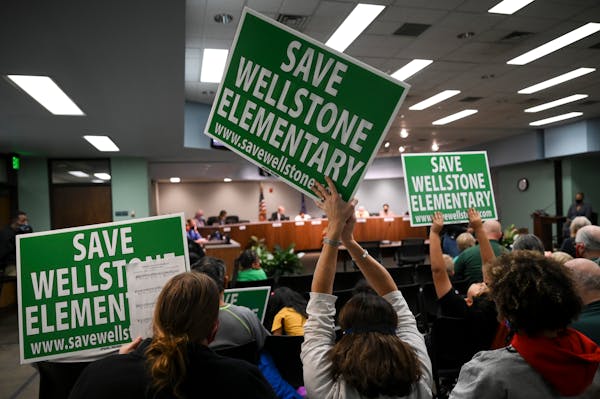The text messages and e-mails flew last week among parents and PTO members when the ax finally fell on Galtier Community School in St. Paul.
Five years earlier, the small school had been saved from closure. But on Dec. 1, the school board voted to cease operations after the 2021-22 school year, touching off considerable emotion and anger — everything but the sharing of potential landing spots for the kids.
"I guess this is how the healing process goes," Anna Peters, the school's PTO president, said this week. "We couldn't ask ourselves, 'Where are you going next year?' It felt like a betrayal of Galtier to even think about another school."
Board approval of the Envision SPPS school consolidation plan puts new pressure on families as they enter the school choice season. There's heat, too, facing the state's second-largest district, which has seen more than 16,000 school-aged children choose other options and now must win over parents critical of Envision's decisionmaking process.
Superintendent Joe Gothard, taking note of next year's closings, wrote this week in a staff newsletter: "To the 2,000 students, their families and staff who are directly impacted by these closings, I am sorry. Cuts such as these are never easy, rarely fair, and not the fault of the school's staff or students."
Action was needed in a system with 8,000 empty seats, officials say.
Initially proposed as a package of closings and mergers to be treated as a whole, Envision was scaled back by the board two days before it was approved, with three schools spared from closure: LEAP High School and Wellstone and Highwood Hills elementary schools.
Some Galtier parents cried foul.
Lisa Zinnel, whose son is a kindergartner at Galtier, said she believed no changes could be made to Envision so she urged a "no" vote on the entire package, even after the more controversial elements were removed and it looked to be a done deal.
"I thought it was important to say to my son that I did speak on behalf of 'your school' and for the interest of all children in St. Paul Public Schools," she said.
Nate Roisen, who also has a kindergartner at Galtier, said he envied the Wellstone community's ability to pack hearings and quote the late U.S. Sen. Paul Wellstone, especially with Galtier's namesake being a "dead French guy from like 400 years ago" — a tongue-in-cheek exaggeration.
"I felt like the deck was always stacked against Galtier," he said, citing among several district missteps the lack of stability stemming from its revolving door of principals.
Under the Envision plan, Galtier is to merge with Hamline Elementary, but families aren't required to send their kids there. Some parents note the combined school still would have fewer than 450 elementary students — a number officials cite as a goal in delivering a well-rounded education with science, music and other subjects taught by specialist teachers.
As such, there is concern over Hamline's long-term future: "I worry it has a target on its back," Zinnel said. "I've heard parents saying, 'Is Hamline next?'"
For years, the district viewed Galtier, at 157 students in 2020-21, as too small and unsustainable. Under Envision, the building is to be transformed into an early learning hub that will bring together preschool, early childhood screening and parenting classes.
Today, that system is tough for families to navigate, Lori Erickson, assistant director in the district's Office of Early Learning, said recently. Monica Potter, supervisor of early childhood family education, said she sees potential for a long-term boost in enrollment via the nurturing approach of the programming.
"You are welcomed and enveloped in this community of learners," she said. "It's really about forging strong relationships together."
As for Galtier and Hamline, the two schools had been promoted as a merger opportunity in 2016, too, and the subsequent fight to save Galtier helped attract Zinnel to the school. She saw that the passion remained, she said.
Roisen's son was a toddler when his dad took him to the school playground, described by many as a social hub in the neighborhood. There, they met Clayton Howatt, a parent who campaigned against Galtier's closing in 2016 and who pitched Galtier to the family.
"There's a stigma out there with the urban schools," Roisen said. "It's a powerful thing to have someone like Clayton say, 'Hey, have you thought about your schools?'"
Roisen and his wife now are members of a PTO that last month raised $4,000 for struggling families at a school in which 70% qualify for free or reduced-price lunches. The money can be used "in the way they know best," said Peters, the PTO president.
She lives four blocks from Hamline, but wants to hear from other parents before deciding where to send her two daughters. Wherever families go, she said, she hopes they bring with them Galtier's "culture of compassion, social justice and collective support."
Roisen said he may look beyond Hamline to a school with more resources.
Zinnel, who comes from a family of public school educators, said she is prepared to do the unthinkable and consider charter and private schools for her son. She knows what she is losing as part of Envision, she said, but still doesn't understand what she is to gain — and she blames the district for that failure to explain.

How Minnesota House Republicans ended the DFL's state government trifecta
Project 2025 platform proposal aims to allow mining in Boundary Waters watershed

Ann Johnson Stewart wins special election, giving DFL control of Minnesota Senate

Democratic U.S. Sen. Amy Klobuchar defeats GOP challenger Royce White


